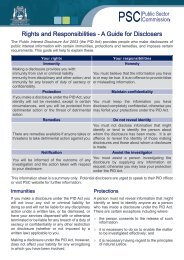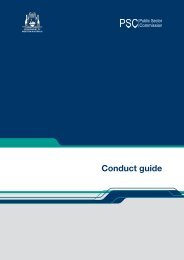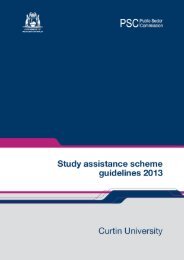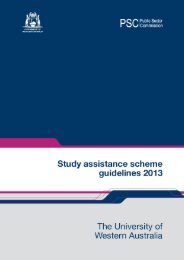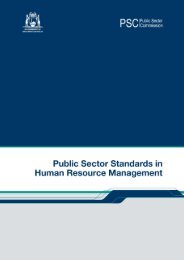Information for Principal Executive Officers - Public Sector Commission
Information for Principal Executive Officers - Public Sector Commission
Information for Principal Executive Officers - Public Sector Commission
You also want an ePaper? Increase the reach of your titles
YUMPU automatically turns print PDFs into web optimized ePapers that Google loves.
Strengthened protections <strong>for</strong> disclosersChanges to public interest disclosures in Western Australia<strong>In<strong>for</strong>mation</strong> <strong>for</strong> <strong>Principal</strong> <strong>Executive</strong> <strong>Officers</strong>The <strong>Public</strong> Interest Disclosure Act 2003 (the Act) changed on 21 November 2012 whenamendments contained in the Evidence and <strong>Public</strong> Interest Disclosure Legislation AmendmentAct 2012 came into operation. Changes to the Act: expand capacity to make public interest disclosures enhance protections available <strong>for</strong> disclosers of public interest in<strong>for</strong>mation expressly enable a person to make an anonymous public interest disclosure allow a public interest disclosure to be made to a journalist under certain conditions provide another circumstance where the identity of the discloser and the subject of adisclosure can be revealed.Do the changes affect my public authority?Yes. The Act and its amendments affect all public authorities including ministers, members ofparliament, judicial officers, State public sector agencies, government trading enterprises,local governments and public universities as well as public sector contractors.What are the changes and what do I need to do?Summary of changesYou need to…If someone believes they have or will be subject todetrimental action in reprisal <strong>for</strong> making a protecteddisclosure, they may apply to the Supreme Court <strong>for</strong>either an order remedying the detrimental action orinjunctive relief.A public service officer or public sector employee whobelieves they have been, or will be, subject to detrimentalaction in reprisal <strong>for</strong> making a protected disclosure mayapply to their employer to be relocated.The employer will be required to relocate the employeeaway from the employee’s existing work location whenrelocation is the only practical means of substantiallyreducing the danger of reprisal (provided the employeeconsents to the proposed relocation).Ensure you provide protection from detrimentalaction, or the threat of detrimental action <strong>for</strong> anyemployee making a disclosure (s23(1)(b) of the Act).Ensure you and your public interest disclosureofficer(s) (PID officer(s)) are aware of this extraavenue of redress <strong>for</strong> disclosers.Ensure you provide protection from detrimentalaction, or the threat of detrimental action <strong>for</strong> anyemployee making a disclosure (s23(1)(b) of the Act).Reprisal action is also an offence under s14 of theAct.Ensure you and your PID officer(s) understand therelocation obligations, including the need to maketransparent decisions about relocating an employee.Note: This applies to ‘public service employees’,defined as employees of a department, SESorganisation or non-SES organisation in the<strong>Public</strong> <strong>Sector</strong> Management Act 1994.Page 1 of 2
Anonymouspublic interestdisclosuresDisclosures to journalistsConfidentialityA person may make an anonymous public interestdisclosure.If a person makes an anonymous disclosure, therelevant public authorities are relieved of their obligationto notify the discloser of the status or outcome of anyinvestigation initiated as a result of the disclosure.A person may make a disclosure to a journalist, providedthey disclose in<strong>for</strong>mation which is substantially the sameas they disclosed in the original disclosure AND theproper authority receiving the original disclosure or theperson to whom a matter raised by the disclosure wasreferred under s9(1)(b) of the Act: refused to investigate, or discontinued theinvestigation of a matter raised by the disclosure; or did not complete an investigation within six monthsof the matter being raised; or completed an investigation but did not recommendthat action be taken; or did not notify the discloser within three months ofthe disclosure being made about the proposedactions or action taken; or did not provide a report stating the outcome ofinvestigation and any action proposed or taken andthe reasons <strong>for</strong> those actions.A journalist is someone engaged in the profession oroccupation of journalism in connection with thepublication of in<strong>for</strong>mation in a medium <strong>for</strong> disseminationto the public of news and observation of news.A person who makes a disclosure to a journalist, underthe circumstances outlined above, is taken to be aperson who makes a public interest disclosure (and theywill receive all the associated protections under the Act).Update your internal procedures to reflect thischange (if anonymous disclosures are not alreadycovered).Ensure you and your PID officer(s): appropriately manage your obligations under theAct, these include investigating matters in atimely manner and notifying disclosers inaccordance with s10 of the Act ensure disclosure matters are thoroughlyexamined and final reports give enoughin<strong>for</strong>mation <strong>for</strong> disclosers to understand why noaction may have been taken, or what and whyaction is or is not recommended are aware that despite the Act providing that aproper authority (PID officer) may refuse toinvestigate a disclosure or discontinue aninvestigation, the matter may still be authorisedby the Act to be disclosed to a journalist advise any referral body investigating a matterthat a referred matter can be further disclosed toa journalist (in certain circumstances, outlined inthe left column).Ensure you and your PID officer(s) understand that aperson who makes an appropriate disclosure to ajournalist is considered and treated as a person whomakes a public interest disclosure.A person may need to identify the discloser or subject ofa public interest disclosure if they have been ordered bya Court or another person/body with the authority tomake such an order.Ensure you and your PID officer(s) discuss thisprovision with potential disclosers and whererelevant, subjects of the disclosure, to make themaware of this provision.Where can I get further assistance?The amended Act is available to view on the State Law Publisher website: www.slp.wa.gov.auYou, as a <strong>Principal</strong> <strong>Executive</strong> Officer, and your PID officer can also contact the<strong>Public</strong> <strong>Sector</strong> <strong>Commission</strong>’s Advisory Line on 6552 8888.Please note: This in<strong>for</strong>mation is provided as a general summary of the changes to the <strong>Public</strong> InterestDisclosure Act 2003, resulting from the proclamation of the Evidence and <strong>Public</strong> Interest Disclosure LegislationAmendment Act 2012. You may wish to seek further legal or other professional advice be<strong>for</strong>e taking any action.The <strong>Commission</strong> gratefully acknowledges the NSW Ombudsman in the development of this factsheet.Page 2 of 2





